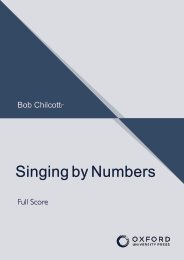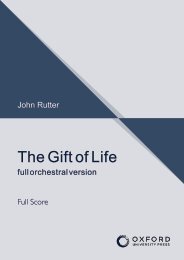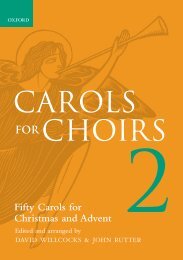R. Vaughan Williams - Sir John in Love
This four-act comic opera celebrating Shakespeares Sir John Falstaff was given it first professional performance in 1946. The libretto, written by the composer, is based on The Merry Wives of Windsor and interpolates texts by contemporaries of Shakespeare such as Christopher Marlowe, Ben Jonson, and Thomas Campion. The work contains English folksong material and fine examples of the composers orchestral lyricism and dramatic flair. Music from the opera was later adapted to form the cantata In Windsor Forest and the Fantasia on Greensleeves. For this comprehensive new edition, the editor (and conductor) David Lloyd-Jones has drawn on all available sources, providing an authoritative full score with critical commentary. The performance materials are newly-engraved.
This four-act comic opera celebrating Shakespeares Sir John Falstaff was given it first professional performance in 1946. The libretto, written by the composer, is based on The Merry Wives of Windsor and interpolates texts by contemporaries of Shakespeare such as Christopher Marlowe, Ben Jonson, and Thomas Campion. The work contains English folksong material and fine examples of the composers orchestral lyricism and dramatic flair. Music from the opera was later adapted to form the cantata In Windsor Forest and the Fantasia on Greensleeves.
For this comprehensive new edition, the editor (and conductor) David Lloyd-Jones has drawn on all available sources, providing an authoritative full score with critical commentary. The performance materials are newly-engraved.
You also want an ePaper? Increase the reach of your titles
YUMPU automatically turns print PDFs into web optimized ePapers that Google loves.
preface<br />
The Play<br />
The Merry Wives of W<strong>in</strong>dsor, on which Ralph <strong>Vaughan</strong> <strong>Williams</strong><br />
based his libretto for his second full-length opera, <strong>Sir</strong> <strong>John</strong> <strong>in</strong><br />
<strong>Love</strong>, is unusual <strong>in</strong> the entire Shakespeare canon <strong>in</strong> that it is<br />
the only one of his comedies that takes place <strong>in</strong> contemporary<br />
England, featur<strong>in</strong>g the bourgeoisie and servant class of a<br />
country town, and, more especially, the one that of all thirtyseven<br />
plays conta<strong>in</strong>s by far the smallest number of l<strong>in</strong>es <strong>in</strong><br />
verse. Popular belief, first recorded <strong>in</strong> the late seventeenth<br />
century, has it that, hav<strong>in</strong>g attended a performance of Henry<br />
IV, Part One, Queen Elizabeth expressed a desire to see a new<br />
play show<strong>in</strong>g the great comic character <strong>Sir</strong> <strong>John</strong> Falstaff <strong>in</strong><br />
love, and that, as a result, <strong>in</strong> 1597–8 (as is now thought),<br />
Shakespeare cobbled together some exist<strong>in</strong>g material at great<br />
speed (hence the amount of prose) to comply with her request.<br />
The play exists <strong>in</strong> two formats: (1) a shorter, unofficial, ‘bad’<br />
Quarto of 1602, which shows signs of be<strong>in</strong>g a ‘memorial<br />
reconstruction’ of the play by actors (<strong>in</strong> which the player of the<br />
Host of the Garter Inn seems to have taken a major part); and<br />
(2) the considerably fuller, more reliable, text of the 1623 First<br />
Folio. This historic publication, however, was <strong>in</strong>fluenced by the<br />
pass<strong>in</strong>g <strong>in</strong> the meantime of James I’s Act to Restra<strong>in</strong> Abuses of<br />
Players of 1606, which forbade the use of such words as ‘God’,<br />
‘Lord’, ‘Ieshu’, and others much used <strong>in</strong> the Quarto, so that<br />
they have usually been expurgated <strong>in</strong> the Folio with the milder<br />
‘Heaven’ or ‘Heavens’. Modern editors sometimes restore the<br />
Quarto text on such occasions, and <strong>in</strong> this respect the autograph<br />
full score and subsequent published vocal score of the opera<br />
sometimes differ (see Textual Notes).<br />
Libretto<br />
Although <strong>in</strong> the twentieth century the scholarly Arden edition<br />
of the play had first appeared <strong>in</strong> 1904 and the Oxford edition<br />
<strong>in</strong> 1910, accord<strong>in</strong>g to his wife, Ursula, <strong>Vaughan</strong> <strong>Williams</strong> used<br />
a n<strong>in</strong>eteenth-century illustrated edition of Shakespeare given<br />
to him by his grandmother Carol<strong>in</strong>e Darw<strong>in</strong> (sister of Charles)<br />
as the basis of his libretto; this <strong>in</strong>cluded <strong>in</strong>cipits of music<br />
mentioned <strong>in</strong> the plays. 1 The programme for the 2006 English<br />
National Opera stag<strong>in</strong>g of the opera, produced while Ursula<br />
was still alive, shows a Victorian-look<strong>in</strong>g page that gives an<br />
eight-bar E m<strong>in</strong>or early version of ‘Greensleeves’. Sadly, it is<br />
not known what has happened to the volume s<strong>in</strong>ce Ursula’s<br />
death. The British Library houses the composer’s annotated<br />
typescript of his libretto that he used dur<strong>in</strong>g the composition<br />
of the opera (see Sources).<br />
Choice of subject<br />
It is surpris<strong>in</strong>g that <strong>Vaughan</strong> <strong>Williams</strong> decided to write such a<br />
full-scale, four-act, work, <strong>in</strong> view of the dearth of opportunities<br />
for stag<strong>in</strong>g native opera <strong>in</strong> England <strong>in</strong> the 1920s. He had<br />
composed his two-act ‘romantic ballad opera’ Hugh the Drover<br />
between 1910 and 1914 but had not orchestrated it until he<br />
returned from military service at the end of World War I, and<br />
he had had to wait until July 1924 for its first private (student)<br />
stag<strong>in</strong>g at the Royal College of Music, and until later that year<br />
when it was semi-professionally performed by the British<br />
National Opera Company, both conducted by the young Dr<br />
Malcolm Sargent. Furthermore, he knew only too well that<br />
successful operas on the same subject, notably by Nicolai<br />
(1849) and, more especially, Verdi (1893), posed a very<br />
real threat to the success of his treatment, someth<strong>in</strong>g that he<br />
tried to expla<strong>in</strong> <strong>in</strong> the published vocal score. 2 True, <strong>in</strong> August<br />
1912, and later <strong>in</strong> the spr<strong>in</strong>g/summer of 1913, he had spent<br />
some weeks <strong>in</strong> Stratford-upon-Avon where he had written<br />
and conducted, among other scores, <strong>in</strong>cidental music for the<br />
actor-manager F. R. Benson’s production of The Merry Wives<br />
of W<strong>in</strong>dsor at the old Memorial Theatre. 3 It was at this time<br />
that he is known to have first used the 1580s’ popular song<br />
‘Greensleeves’ (which Holst had used two years previously),<br />
doubtless <strong>in</strong> response to Mistress Ford’s pass<strong>in</strong>g reference to<br />
the tune (Act IV, Scene I) and to Falstaff’s l<strong>in</strong>es ‘Let the sky<br />
ra<strong>in</strong> potatoes, let it thunder to the tune of ‘Greensleeves’ (Act<br />
V, Scene V). In her biography of her late husband, Ursula<br />
<strong>Vaughan</strong> <strong>Williams</strong> tells us that he had not previously known<br />
the play (which was out of favour with avant guard thought at<br />
the time), and that he had been so taken with it at Stratford<br />
that, on return<strong>in</strong>g to London, he toyed with the idea of bas<strong>in</strong>g<br />
an opera on it. At the same time, he must have felt that it was<br />
about time that a British composer tackled this irresistible<br />
native subject, one moreover <strong>in</strong> which he could make use of<br />
his great <strong>in</strong>terest <strong>in</strong> folk songs, folk dances and the Jacobean<br />
masque.<br />
<strong>Vaughan</strong> <strong>Williams</strong>’s love of the play and his relative<br />
<strong>in</strong>experience as an opera composer contributed to a<br />
miscalculation <strong>in</strong> the design of his libretto. Whereas Boito,<br />
work<strong>in</strong>g for Verdi to produce his f<strong>in</strong>al commedia lirica, had<br />
reduced the s<strong>in</strong>g<strong>in</strong>g personnel to a cast of ten (dispens<strong>in</strong>g<br />
with Shallow, Slender, Simple, Evans, Page, Nym, the Host,<br />
Rugby, and three servants), <strong>Vaughan</strong> <strong>Williams</strong> has twenty<br />
Perusal Score<br />
Not for Performance<br />
(reflect<strong>in</strong>g the twenty-two speak<strong>in</strong>g parts <strong>in</strong> the First Folio),<br />
though five may be taken by members of the chorus and<br />
the roles of Shallow and Dr Caius doubled by one s<strong>in</strong>ger<br />
(see vocal score for details). Nevertheless, he shows great<br />
imag<strong>in</strong>ation <strong>in</strong> his adaptation of Shakespeare, juxtapos<strong>in</strong>g<br />
episodes at will and mak<strong>in</strong>g judicious cuts, though some<br />
would say not enough. Above all, he has outdone Boito/<br />
Verdi <strong>in</strong> one respect. In order to <strong>in</strong>crease the lyrical content<br />
of the opera, he has <strong>in</strong>serted a number of verses from other<br />
v

















